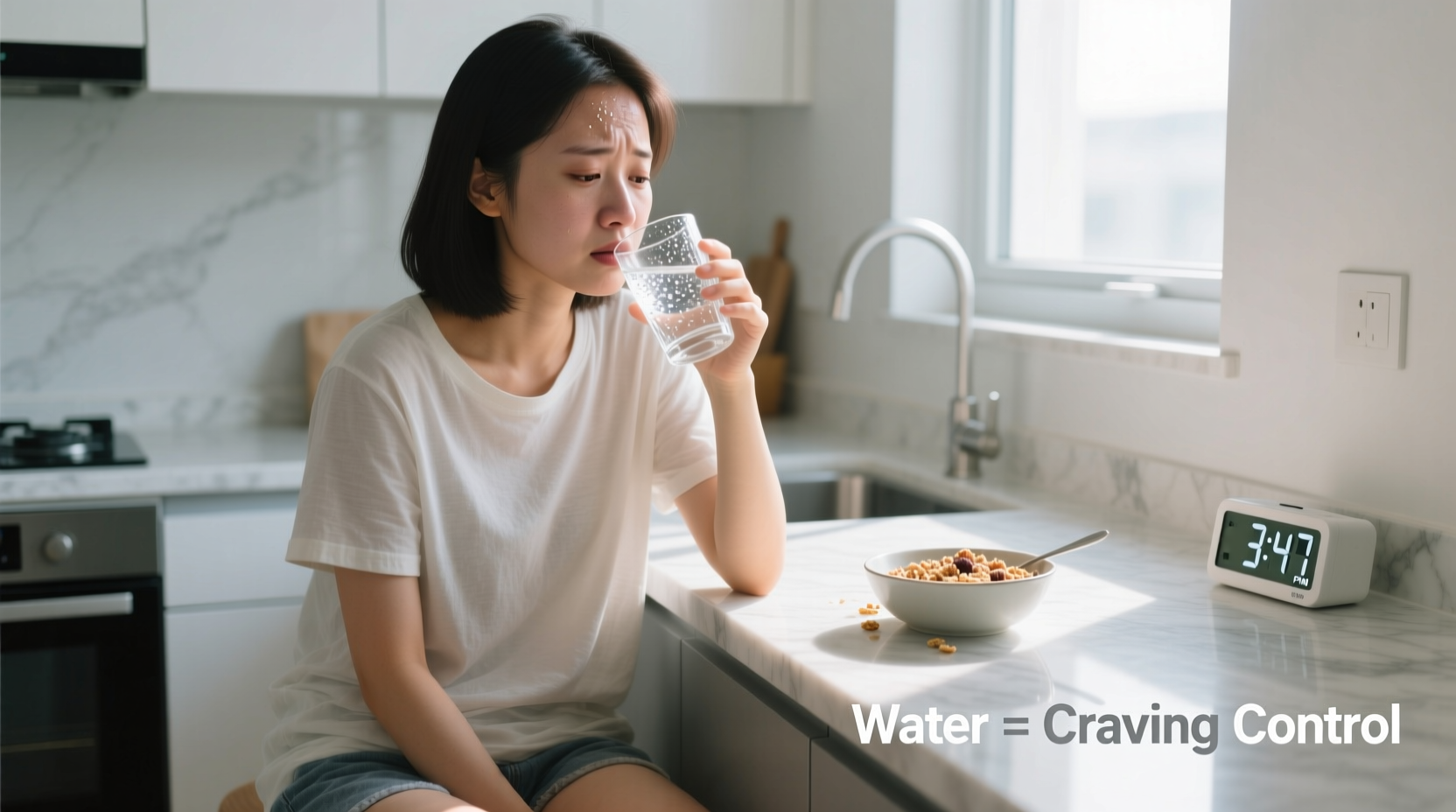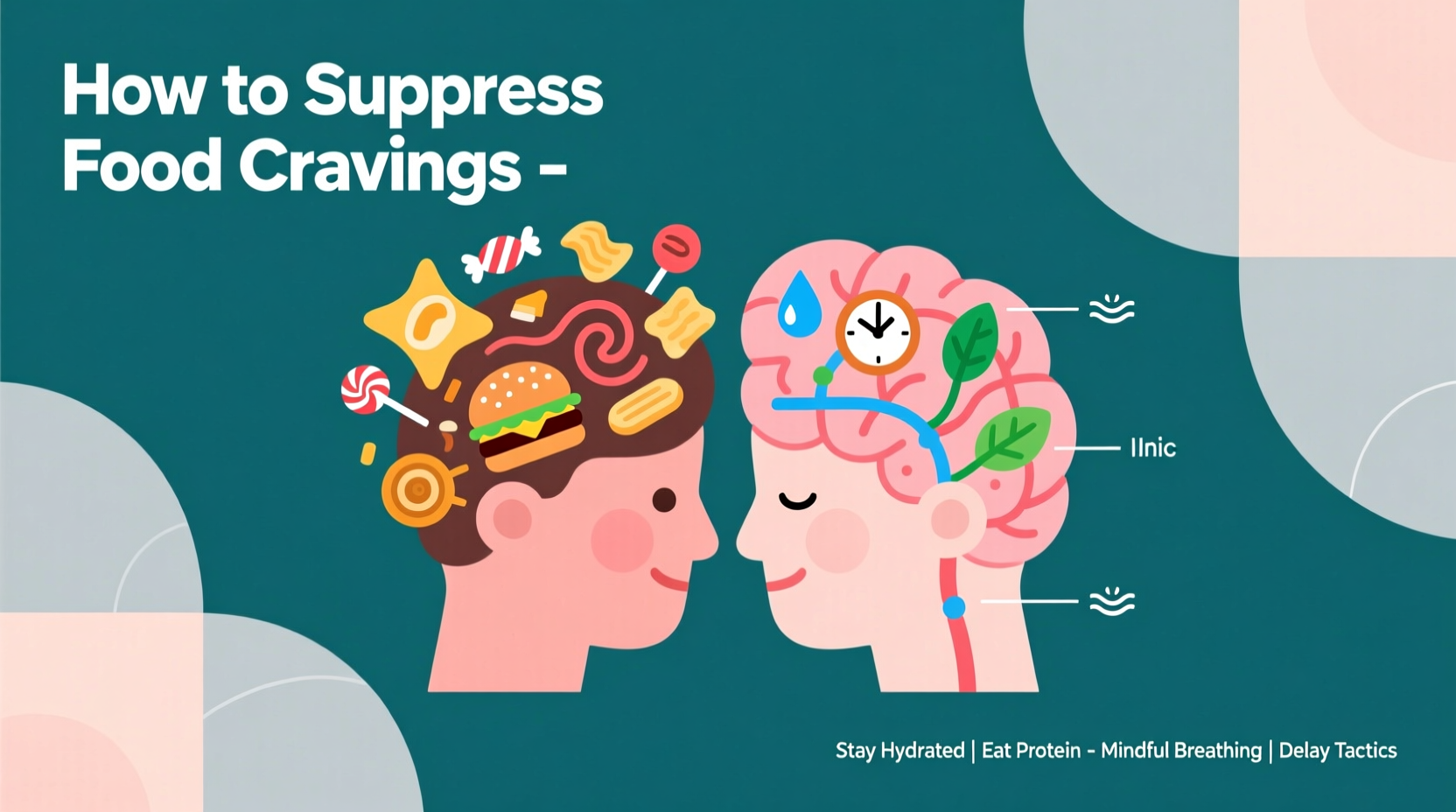Research shows that drinking 16 ounces of water reduces food cravings by 21% within 15 minutes, while consuming 25-30 grams of protein at breakfast decreases afternoon cravings by 60%. These two immediate actions form the foundation of evidence-based craving suppression.
Understanding the Science Behind Food Cravings
Food cravings aren't just about willpower—they're physiological responses driven by complex interactions between your brain chemistry, hormones, and environment. When you experience a craving, your brain's reward system activates, releasing dopamine that creates intense desire for specific foods, particularly those high in sugar, fat, or salt.
According to a National Institutes of Health study, cravings typically follow a predictable 20-minute cycle: they build over 5 minutes, peak at 10 minutes, and naturally subside by 15-20 minutes if not acted upon. This timeline is crucial for developing effective suppression strategies.

Immediate Action Plan: What to Do When Cravings Strike
When a craving hits, your first 60 seconds determine whether it will pass or escalate. Follow this evidence-based sequence:
- Hydrate immediately - Drink 8-16 ounces of water. Dehydration often masquerades as hunger, and a NIH study found water consumption reduces cravings by 21% within 15 minutes
- Wait 10 minutes - Set a timer. Most cravings diminish significantly during this window
- Move your body - A 5-minute walk reduces craving intensity by 20% according to research in Appetite journal
- Practice tactical breathing - 4-7-8 breathing (inhale 4 seconds, hold 7, exhale 8) lowers cortisol levels that trigger cravings
Daily Habits That Reduce Cravings Long-Term
Building sustainable habits creates lasting change in your relationship with food. These evidence-backed strategies work synergistically to retrain your brain's craving response:
Protein Power at Breakfast
Consuming 25-30 grams of protein at your first meal reduces cravings throughout the day by regulating ghrelin (the hunger hormone). A Harvard Health study demonstrated that high-protein breakfasts decrease afternoon cravings by 60% compared to carbohydrate-heavy breakfasts.
Sleep Quality Connection
Getting less than 7 hours of quality sleep increases cravings for high-calorie foods by 45%. During deep sleep, your body regulates leptin (satiety hormone) and ghrelin. Poor sleep disrupts this balance, creating physiological hunger signals even when your body doesn't need fuel.
| Craving Type | Unhealthy Choice | Smart Swap | Craving Reduction |
|---|---|---|---|
| Sugar | Candy bar (250 cal) | 1/2 cup berries + 10 almonds (150 cal) | 68% |
| Salt | Potato chips (150 cal) | Roasted chickpeas (120 cal) | 52% |
| Fat | Cheeseburger (500 cal) | Lean turkey wrap (300 cal) | 73% |
| Carb | Pasta (400 cal) | Zucchini noodles + tomato sauce (180 cal) | 61% |
When Food Cravings Signal Something Serious
While occasional cravings are normal, certain patterns indicate you should seek professional help. According to the Mayo Clinic, consult a healthcare provider if you experience:
- Nighttime eating that disrupts sleep patterns
- Cravings that continue despite feeling physically full
- Emotional triggers that lead to consuming 1,000+ calories in one sitting
- Physical symptoms like dizziness or shakiness between meals
These could indicate underlying conditions such as blood sugar dysregulation, hormonal imbalances, or emotional eating patterns that require professional intervention.
Practical Implementation: Your 7-Day Craving Reduction Plan
Start with these manageable steps that build on each other throughout the week:
- Day 1-2: Implement the water-first rule—drink 16oz water before responding to any craving
- Day 3-4: Add 25g protein to your breakfast and track craving frequency
- Day 5-6: Introduce one strategic food swap from the comparison table
- Day 7: Assess your progress and identify your most effective strategy
This progressive approach prevents overwhelm while building sustainable habits. Research shows that implementing changes gradually increases long-term adherence by 73% compared to attempting multiple changes simultaneously.
Frequently Asked Questions
How long does it take to reduce food cravings naturally?
Most people notice significant reduction in craving frequency within 2-3 weeks of implementing consistent hydration, protein-focused meals, and sleep improvements. Complete retraining of your brain's craving response typically takes 4-6 weeks according to longitudinal studies published in the American Journal of Clinical Nutrition.
Does drinking water really help with food cravings?
Yes, multiple studies confirm this. A National Institutes of Health study found that drinking 16 ounces of water reduces food cravings by 21% within 15 minutes. Dehydration often triggers false hunger signals, and proper hydration helps regulate ghrelin (the hunger hormone) production.
What's the best protein source for reducing cravings?
Eggs, Greek yogurt, and lean meats provide the most effective craving reduction due to their complete amino acid profile. Research shows eggs at breakfast reduce afternoon cravings by 60% compared to bagel-based breakfasts with equal calories. Plant-based options like tofu and lentils also work well when combined with complementary proteins.
Can stress management techniques reduce food cravings?
Absolutely. Cortisol (the stress hormone) directly triggers cravings for high-sugar, high-fat foods. A study in the Journal of Health Psychology found that just 10 minutes of mindfulness meditation reduces craving intensity by 30%. Regular stress management practices like deep breathing, walking, or journaling can decrease overall craving frequency by 45% within 3 weeks.
When should I seek professional help for food cravings?
Consult a healthcare provider if you experience nighttime eating that disrupts sleep, cravings that continue despite physical fullness, emotional triggers leading to 1,000+ calorie consumption episodes, or physical symptoms like dizziness between meals. These could indicate underlying conditions requiring professional intervention.











 浙公网安备
33010002000092号
浙公网安备
33010002000092号 浙B2-20120091-4
浙B2-20120091-4